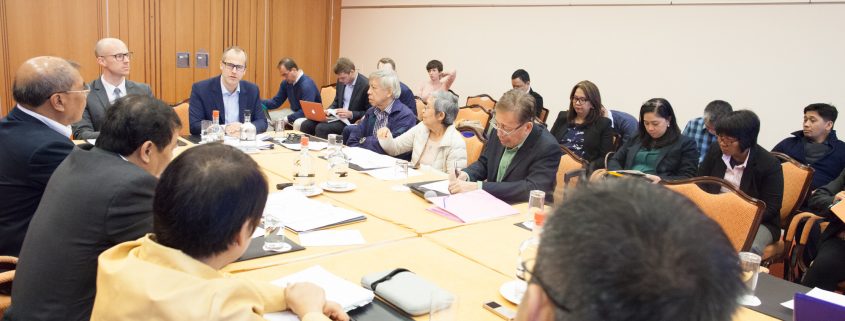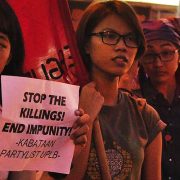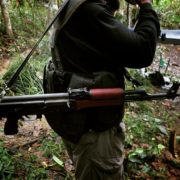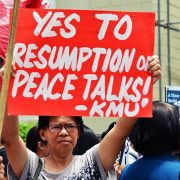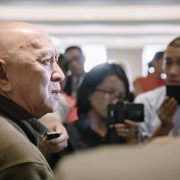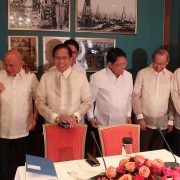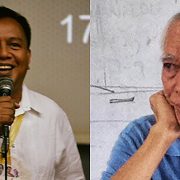Socio-economic reforms: Forgotten part of the 4th round?
NOORDWIJK, The Netherlands—President Rodrigo Duterte’s “barest conditionalities” have put the limelight on the ceasefire agenda in the Government of the Republic of the Philippines (GRP) and the National Democratic Front of the Philippines’ (NDFP) fourth round of formal talks in this seaside town. While the NDFP repeatedly tries to underscore it should be the substantive socio-economic reforms agenda that should take center stage in this round, it almost cannot be helped that greater interest is shown on Duterte’s demand for a signed bilateral ceasefire agreement. This round’s opening ceremony was in fact postponed twice to resolve the snags created by Duterte’s eleventh hour instructions to GRP negotiators.
At the end of the third day of negotiations last night, negotiators from both parties can be observed exchanging notes and consulting on what can only be surmised as issues related to Duterte’s conditionalities. To observers, there seems to be a greater sense of urgency among the negotiators to come to an agreement on Duterte’s demands. It also seems that this round’s success would be measured on whether the President’s four conditions are met or not and the possibility of the fifth round of formal talks in June are hinged on satisfying them. The heightened interest on negotiations for a new ceasefire agreement—be it bilateral, joint, reciprocal or unilateral or interim or indefinite—is of course helped along by journalists constantly fielding questions related to the prospective ceasefire agreement.
Meanwhile, the Reciprocal Working Committees on Socio-Economic Reforms (RWC-SER) are mostly left alone to go quietly on with their work.
Unprecedented gains
Within just two days of formal negotiations, RWC-SERs have already met three times. According to reports, they have built on the unprecedented gains of the third formal talks in Rome, Italy last January where both parties “agreed on principle” on free land distribution.
At the RWC-SER’s second bilateral meeting yesterday morning, the committees identified enough number of concurrences in each other’s draft they are already looking at reconciling the first part of a prospective Comprehensive Agreement on Socio-Economic Reforms (CASER): agrarian reform and rural development (ARRD). With four more RWC-SER bilateral meetings scheduled until tomorrow, the NDFP is optimistic that apart from finalizing ARRD, discussions on national industrialization could begin before this fourth round ends.
NDFP Jose Maria Sison predicted this momentous achievement in his opening remarks last Monday. “I have read and studied the drafts of the proposed agreements from the GRP and NDFP and I have also examined the comparative matrices. I observe that there are enough concurrences and similar positions as common ground for forging the agreements,” Sison said. “I continue to be optimistic that within this year, it is possible for the GRP and NDFP Negotiating Panels to forge and sign the Comprehensive Agreement on Social and Economic Reforms (CASER) and the consequent joint ceasefire agreement,” he said.
Sison said the RWC-SER can proceed to unify their respective drafts at an accelerated pace during rounds of formal talks and work meetings of bilateral teams and even between rounds of formal negotiations. After an “ultimate common draft” is signed by the panels and principals, it may even serve as guide and framework of executive orders and legislation “to carry out genuine land reform, lay the foundation of national industrialization, ensure the protection of the environment and wise utilization of natural resources, uphold the people’s rights, improve the wage and living conditions, expand the social services (especially free public education at all levels and free public hospitals and clinics) and develop international economic relations within the context of an independent foreign policy.”
What Sison described is practically what government and what a just society should be all about. More importantly, these are the concrete steps in addressing the roots of the armed conflict, the reason why the 48-year old CPP waged its revolution in the first place. Even GRP chief negotiator Silvestre Bello III described the socio-economic reforms agenda as the “heart and soul” of the peace negotiations.
Most important
A ceasefire agreement is, of course, important. But, as NDFP chief negotiator Fidel Agcaoili in his own opening remarks said, it is (only) “for the creation of conditions conducive to reaching agreements on basic reforms.”
There have been countless ceasefires (bilateral, joint, or unilateral) in the 48-year old revolution and in the 31-year history of the NDFP-GRP peace negotiations. The most recent reciprocal unilateral ceasefire declarations (August 2016 to February 2017), in fact, being the longest. There is one common denominator in all of them, however: they all end, sooner or later. Ceasefires in the Philippines always have a way of being violated, as when the Armed Forces of the Philippines attacked an NPA encampment in Makilala, North Cotabato when the GRP and the NDFP were in the midst of a very productive formal round last January.
The GRP-NDFP peace panels are very nearly halfway through forging a comprehensive agreement on socio-economic reforms. It is befuddling why this fact is lost on many minds, including, it seems, Duterte’s. Beyond the issue of ceasefire, what all Filipinos must focus on are the achievements on socio-economic reforms negotiations. When completed and implemented, it will effectively end the nearly-five decade civil war in the Philippines.
Because no temporary ceasefire could ever match a permanent end to the hostilities ushered in by a just and lasting peace. # (Raymund B. Villanueva)

